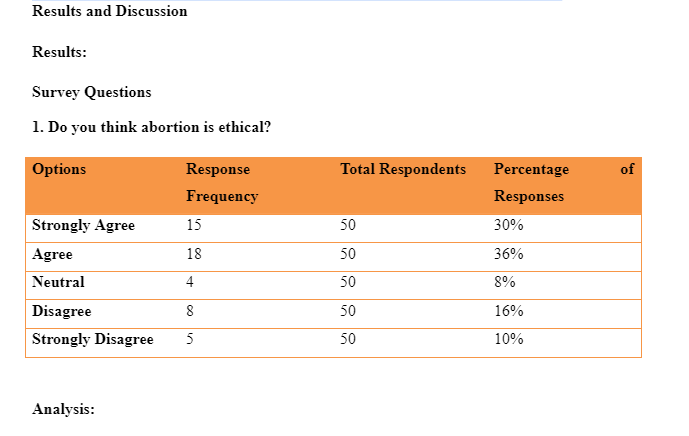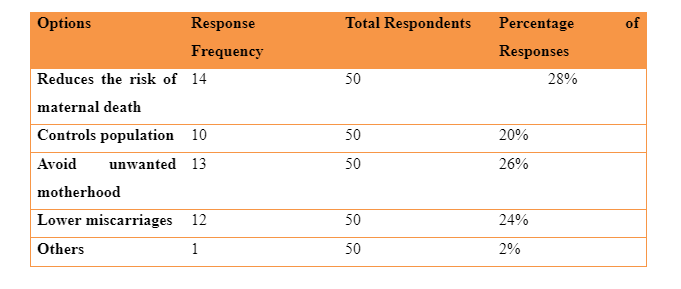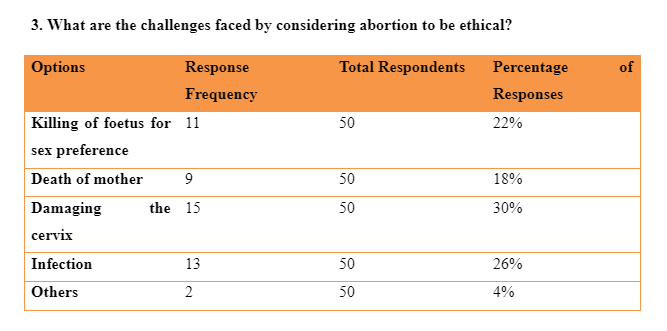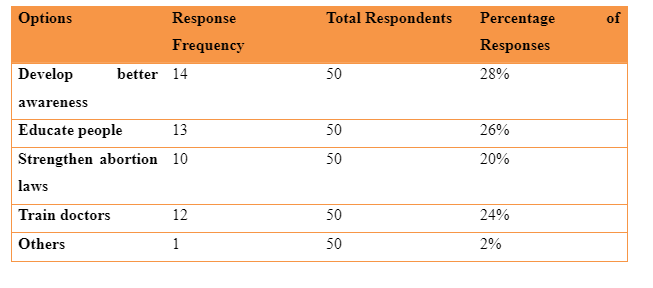Abortion Rates And Perceptions In Developing And Developed Countries
Introduction
The World Health Organisation (WHO) informs that on an average 56 million abortions have been executed worldwide from 2010 to 2014. Moreover, WHO mentions that the annual aborption rate is 37 per 1000 women in developing countries and 27 per 1000 women in the developed countries (who.int, 2015). This informs that abortion in the developing countries have raiseds compared to the developed countries. In this study, the need for abortion and reason behind abortion being ethical is to be discussed. In this purpose, proper research methodology is to be explained along with results are to be discussed regarding the reason behind abortion being ethical, which may also benefit from healthcare dissertation help for a deeper understanding of the ethical considerations involved.

Rationale of the Study
The moral debate regarding abortion being ethical or unethical in nature is mainly based on the value of life of the unborn baby or foetus. Among many religions and nations, it is seen that stigma regarding abortion exists that terminating pregnancy through the process is killing an innocent life which leads it to be considered as unethical act (Martin, 2018). This is because even though the baby is not born yet it was alive in the mother’s womb and terminating the foetus life without their consent is considered illegal in the view. However, there are views that support abortion to be ethical as it helps to lower the rate of maternal death as well as assist in controlling population.
In the UK, the introduction of the Abortion Act was done in 1967 which legalised and considered abortion as ethical practice in Great Britain but it was not extended to Northern Ireland. This led abortion to be a punishable offence in the country (legislation.gov.uk, 1967). In 2012, as a result of lack of consideration of abortion to be ethical, it led to the death of an Indian woman named Savita Halappanavar in Northern Ireland. The death of the women resulted in many protests against the law and the government reviewed their decision to make abortion in certain medical condition to be ethical and illegal practice under Protection of Life During Pregnancy Act 2013 (Berer, 2013). Thus, it informs that abortion under certain circumstances is essentially required and it is ethical as there are existing legal supports regarding the activity in the medical field. Therefore, the study would focus on which contexts abortion can be considered ethical to resolve stigma regarding the activity among national and religions as the moral debate regarding it.
Aim
The aim of the study is to identify the reason behind abortion is ethical within society.
Objectives
To identify the concept of ethical abortion
To assess the factors which consider abortion to be ethical
To analyse the challenges faced in considering abortion to be ethical
To recommend strategies in resolving challenges faced in considering abortion to be ethical
Methodology
The interpretivism and positivism are two research philosophy used in studies. The positivism philosophy is referred to the theory in which information that is scientifically verified or have logical proof are used (Ryan, 2019). This informs that positivism philosophy allows resolving issues within the study by using real facts and data. As criticised by Williams et al. (2017), interpretivism involves understanding the information collected for the study through subjective experiences of the individuals. This indicates that interpretivism is based on collecting data by analysing the perspectives of other people regarding the topic. Therefore, in this study, the positivism philosophy is to be used as it would lead to use logical and scientific data in resolving the raised problem in the study. The interpretivism is not to be used as it may lead to rise in error in data evaluation due to differences in preferences and perspectives of participants in analysing the data.
The research approach is of two types which are inductive approach and deductive approach. As asserted by Ingvarsson et al. (2019), inductive approach is involved with generating new theories regarding the study based on the gathered data. In this study, no new theories regarding aborting being ethical can be developed and therefore inductive research approach is not to be used. As criticised by Bergdahl et al. (2019), deductive approach is the process in which the research strategy is developed based on the existing theory to examine the research hypothesis. This informs that through proper reasoning regarding a particular area the study is developed in the approach. Thus, deductive approach is to be used in framing the study so that proper concept, as well as the influence of factors in making abortion ethical, can be understood.
The descriptive research design includes gathering data for the study through observation and measuring without manipulation of the data (Roberts et al. 2016). However, the explanatory research design includes explanation of the situation encountered in the stud through effect and cause. In addition, the exploratory design includes developing insight into the study for later examination of the problems. The explanatory and exploratory designs are used in studies where the aim and objectives of the study are not clearly defined (Zheng, 2015). Thus, the descriptive design is to be used for the study as it would allow critical analysis of the issues in the study where positive and negative factors of the stud are considered to develop well-defined study.
The data collection is to be done by following primary research as it allows gathering of new data that are not used previously. The two data collection methods used in primary research is qualitative and quantitative data collection method. In quantitative data collection method, the numerical information is collected which are represented in the study with the help of graphs and charts. The benefit of using quantitative data is that it allows collection of huge amount of information within limited time and cost allowing the researcher to develop the study within short amount of time and in cost-effective way (Oh and Gastmans, 2015). Therefore, the quantitative data collection is to be used in this study and according to the method close-ended questionnaires are to be provided to the survey participants. The qualitative data collection method involves gathering information by analysing the feelings and expression of the participants. The benefit of using qualitative data collection method is that it allows use of subjective information in resolving the raised research problem (De Visschere et al. 2015). Thus, this method is to be used and for this purpose, semi-structured interview questionnaire is to be used in gathering data.
The probability and non-probability are two nature of sampling methods used in research. In probability sampling, the participants selected for the study are done in a random manner where the selected participants represent the entire population. However, in non-probability sampling, the selection of the participants for the study is done on a purposive basis (Meerwijk and Sevelius, 2017). In this study, the probability and non-probability sampling method are to be used as it would allow resolving limitations to be experienced by using one method over the other in the study (Henderson et al. 2019). According to probability sampling, 50 pregnant women in the UK out of 100 pregnant women are to be selected in arranging the survey for the study. The non-probability sampling is to be used for selecting participants for the interview in which total of 2 gynaecologists is to be interviewed through skype.
Continue your exploration of Unsafe Abortions and Qualitative Data Analysis with our related content.
The ethical consideration in the study is to be maintained by following the Data Protection Act 1998. The Data Protection Act 1998 informs that no personal data of people are to be shared publicly without their prior consent (legislation.gov.uk, 1998). Thus, for ensuring confidentiality anonymity of the participants is to be maintained. Moreover, they are allowed to leave the survey or interview in the mid-way of they feel their privacy is compromised. The participants are to be informed in detailed regarding the way the provided information by them is to be used. Moreover, after completion of the study, the gathered data are to be destroyed to ensure confidentiality and protecting the participants from any harm.

The data informs that 30% have strongly agreed and 36% has agreed the fact that abortion is ethical. However, it is seen that only 8% of participants provided neutral opinion whereas 16% disagreed and 10% strongly disagreed that abortion is ethical. This informs that most of the pregnant women in the UK considered that abortion is ethical and they would prefer to avail the services is required during their pregnancy.
2. Why do you consider abortion to be ethical?

Analysis:
The data collection informs that 28% of the participants consider abortion to be ethical because it lower chances of maternal death whereas 20% considers it to be ethical as it helps in controlling the rise in population. The data also revealed that 26% considered abortion to be ethical as it controls unwanted motherhood whereas 24% considers it to be ethical as it lowers the rate of miscarriages. Thus, it informs that an overall benefit towards the maternal health of the woman can be reached through abortion as well as it could allow controlling population and unwanted birth of child.

Analysis
The data informs that 22% participants think considering abortion to be ethical would lead to illegal killing of foetus based on sex preferences whereas 18% informs that supporting abortion may result in death of mother in certain cases. Further, 30% informs damage to cervix and 26% informs rise in infection within the womb may occur as challenge for the women by considering abortion to be ethical. Thus, it informs that negative impact on the health of the women would act as challenge by supporting abortion to be ethical.
4. How to resolve challenges faced in considering abortion to be ethical?

Analysis:
The data gathered informs that 28% think creating better awareness regarding abortion among the population would result in resolving the challenges faced in considering abortion to the ethical. This is because it would lower the stigma regarding abortion existing in the society helping the population to understand the reason behind the practice is considered ethical. Moreover, 26% informs that better education, 20% considers strengthening the laws and 24% considers training doctors regarding the way to safely executing abortion would avoid challenges that are raised with considering it as ethical practice. This is because people would understand when to perform the practice avoiding the services to be misused.
Interview Questions:
1. What is the duration of execution Abortion in ethical?
The 1st gynaecologist informs that abortion in termination of unwanted pregnancy which is performed within the initial 24 weeks of pregnancy. The 2nd gynaecologist informs that it is induced or spontaneous termination of pregnancy before the foetus reach viability. The practice is mainly done within the initial 20-24 weeks gestation period of pregnancy as the foetus does not develop perception of pain until the third trimester that initiates after 24 weeks of pregnancy.
2. Why do you consider abortion to be ethical?
The 1st gynaecologist informs that abortion is ethical as it helps to save the life of the mother when they are vulnerable to face fatal condition by bearing a child. Moreover, the person informs that abortion is ethical because it lowers the chances of miscarriages as it helps in eliminating pregnancy and avoid childbirth in uncertain condition where the foetus have developed abnormally. The 2nd gynaecologist informs that abortion is ethical because it allows controlling the population by terminating unwanted and inappropriate pregnancy.
Discussion:
The qualitative data gathered informs that abortion is considered to be ethical if it is done within 20-24weeks from the initiation of pregnancy. This is evident from the Abortion Act 1967 of the UK where it is mentioned that execution abortion of foetus within first 24 weeks of gestation period is ethical and safe for the women (legislation.gov.uk, 1967). Moreover, the study of Kulathilaka et al. (2016) informs that within the first 24 weeks of gestation the foetus is unable to develop senses of any pain. This informs that during abortion the foetus is unable to perceive any distressing feeling or perception. Since the process does not inflict any pain to the foetus, therefore it is considered as ethical because it is going to benefit the mother in keeping good health by eliminating miscarriage or fatal consequences as a result of pregnancy.
The qualitative and quantitative data informs that abortion is ethical because it lowers the rate of maternal death. This is evident from the study of Koch et al. (2015) where it is mentioned that during pregnancy as a result of health complication and intricate health disorder or infection the woman may be unable to bear the child. This is because the health complication may lead to unnecessary internal bleeding, haemorrhage and high blood pressure which eventually lead to seizures in pregnant women making them develop fatal consequences and worsened impact on the foetus. Therefore, abortion is ethical as it offers beneficence to the woman by ensuring them good health through termination of pregnancy and maintain non- maleficence by avoiding harm to the mother. The fact is supported by the study of Suarez (2017), where it is informed that abortion helps in lowering rates of maternal death by eliminating fatal consequences due to pregnancy among women.
The qualitative and quantitative data also informs that abortion is ethical as it controls population rise as well as avoid miscarriages along with unwanted motherhood. The fact is supported by the study of Darak et al. (2016) where it is informed that abortion is ethical as it helps in terminating unwanted pregnancy among women who are teenagers. Since the teenage women are often found to be physically unfit to bear child and often shows increased complication such as elevated blood pressure which leads to low birth weight and premature birth of babies along with the increased risk of stillbirth thus in such condition abortion is ethical (Hung, 2017). This is because it creates beneficence for teenage women as by eliminating pregnancy they are allowed to live a safe and healthy life.
The qualitative and quantitative data informs that challenges with considering abortion being ethical are that it may lead people to kill foetus on the basis of sexual preference. This is evident as the study by Ezugworie et al. (2016) informs that the sex of the child may be revealed during the ultrasonography done between 18-22 weeks of initial gestation period. Thus, considering abortion to be ethical may lead to selective killing of foetus that would hinder sex ratio within the population (Zaidi and Morgan, 2016). The other challenge faced by considering abortion to be ethical is that it does not always provide benefit to the mother as many maternal deaths and infection of the uterus are reported to happen during the process. This is evident as executing abortion after 24 weeks of gestation may lead to risk the life of the mother as during this phase the baby is fully developed and intricately attached to the body of the mother. Thus, its removal from the womb may lead to cause damage to the veins making the mother experience internal bleeding which may lead to fatal consequences. In addition, abortion may lead to rapture the uterine walls or lead to infection of the womb during surgery which leads the woman to develop complication in later pregnancy (Bain and Kongnyuy, 2018). Thus, medical complications may arise which act as challenge in considering abortion to be ethical.
Conclusion
The above discussion informs that abortion is the termination of pregnancy by eliminating the foetus from the mother's uterus. The abortion is ethical because it lowers chances of maternal death and health complication but the value of life of foetus raises the moral debate of it being unethical. The findings inform that abortion is ethical as it saves live of the mother as well as benefits by avoiding the painful birth of dysfunctional foetus who is unable to live long. Moreover, the process is ethical as do not inflict any pain or perception to the foetus during its removal and abortion is effective to control miscarriage as well as population level. However, the harm to the mother’s cervix, infection of the womb and others are considered to be challenges that are to be faced with abortion being ethical.
Evaluation

The study is framed by using mixed data collection method which is beneficial as it allows comparing both the qualitative and quantitative data to determine findings for the study (Håkansson et al. 2018). Thus, it allowed gathering data by understanding the perception and feelings of participants as well as objective responses of the participants. Moreover, mixed data collection method allowed collecting enriched and comprehensive data for the study. However, the study was focussed on understanding ethical views of abortion in the UK. Thus, the study cannot be generalised to determine why abortion is considered ethical in other nations or countries. In addition, the sample size is small which may have affected reliability of the study.
Recommendations
In future, the study is required to be done by focussing on perception of abortion being ethical in countries other than the UK to understand more intricate reason behind its validity. Moreover, the sample size is to be increased and the critical analyses of secondary studies are to be involved in collecting data for the study so that effective evidential information supported by scientific findings are gathered which will eventually increase the reliability of the study.
References
- Anselmi, N., D'Aloise, A., Di Febo, R., Pezzuti, L. and Leone, C., 2018. Psychological implications of abortion: a longitudinal study on two cohorts of women who recur to elective and therapeutic abortion. Rivista di psichiatria, 53(6), pp.324-330.
- Bain, L.E. and Kongnyuy, E.J., 2018. Eliminating the high abortion related complications and deaths in Cameroon: the restrictive legal atmosphere on abortions is no acceptable excuse. BMC women's health, 18(1), p.71.
- Bain, L.E. and Kongnyuy, E.J., 2018. Eliminating the high abortion related complications and deaths in Cameroon: the restrictive legal atmosphere on abortions is no acceptable excuse. BMC women's health, 18(1), p.71.
- Berer, M., 2013. Termination of pregnancy as emergency obstetric care: the interpretation of Catholic health policy and the consequences for pregnant women: An analysis of the death of Savita Halappanavar in Ireland and similar cases. Reproductive Health Matters, 21(41), pp.9-17.
- Bergdahl, E., Ternestedt, B.M., Berterö, C. and Andershed, B., 2019. The theory of a co‐creative process in advanced palliative home care nursing encounters: A qualitative deductive approach over time. Nursing open, 6(1), pp.175-188.
- Darak, S., Hutter, I., Kulkarni, V., Kulkarni, S. and Janssen, F., 2016. High prevalence of unwanted pregnancies and induced abortions among HIV-infected women from Western India: need to emphasize dual method use?. AIDS care, 28(1), pp.43-51.
- De Visschere, L., de Baat, C., De Meyer, L., van der Putten, G.J., Peeters, B., Söderfelt, B. and Vanobbergen, J., 2015. The integration of oral health care into day‐to‐day care in nursing homes: a qualitative study. Gerodontology, 32(2), pp.115-122.
- Ezugworie, J.O., Agu, A.U., Onah, C.N., Nto, J.N. and Okeke, T.C., 2016. Prenatal ultrasound sex identification: Some factors that influence pregnant women's requests in Enugu, South-East Nigeria. Journal of Experimental and Clinical Anatomy, 15(2), p.107.
- Håkansson, M., Oguttu, M., Gemzell-Danielsson, K. and Makenzius, M., 2018. Human rights versus societal norms: a mixed methods study among healthcare providers on social stigma related to adolescent abortion and contraceptive use in Kisumu, Kenya. BMJ global health, 3(2), p.e000608.
- Henderson, E.R., Blosnich, J.R., Herman, J.L. and Meyer, I.H., 2019. Considerations on Sampling in Transgender Health Disparities Research. LGBT health, 6(6), pp.267-270.
- Hung, S., 2017. Claiming agency in sexuality: A feminist approach to empowering teenage women with experience of abortion in Hong Kong. Journal of Applied Youth Studies, 1(4), p.5.
- Ingvarsson, E., Verho, J. and Rosengren, K., 2019. Managing Uncertainty in Nursing-Newly Gradu-ated Nurses’ Experiences of Introduction to the Nursing Profession. International Archives of Nursing and Health Care, 5, p.119.
- Koch, E., Chireau, M., Pliego, F., Stanford, J., Haddad, S., Calhoun, B., Aracena, P., Bravo, M., Gatica, S. and Thorp, J., 2015. Abortion legislation, maternal healthcare, fertility, female literacy, sanitation, violence against women and maternal deaths: a natural experiment in 32 Mexican states. BMJ open, 5(2), p.e006013.
- Kulathilaka, S., Hanwella, R. and de Silva, V.A., 2016. Depressive disorder and grief following spontaneous abortion. BMC psychiatry, 16(1), p.100.
- legislation.gov.uk 1967, Abortion Act 1967, Available at: http://www.legislation.gov.uk/ukpga/1967/87/contents [Accessed on: 28 December 2019]
- legislation.gov.uk 1998, Data Protection Act 1998, Available at: http://www.legislation.gov.uk/ukpga/1998/29/contents [Accessed on: 28 December 2019]
- Martin, T., 2018. Interests in abortion: a new perspective on foetal potential and the abortion debate. London: Routledge.
- Meerwijk, E.L. and Sevelius, J.M., 2017. Transgender population size in the United States: a meta-regression of population-based probability samples. American journal of public health, 107(2), pp.e1-e8.
Looking for further insights on A Vital Process for Oxygenation and Health? Click here.
- 24/7 Customer Support
- 100% Customer Satisfaction
- No Privacy Violation
- Quick Services
- Subject Experts



